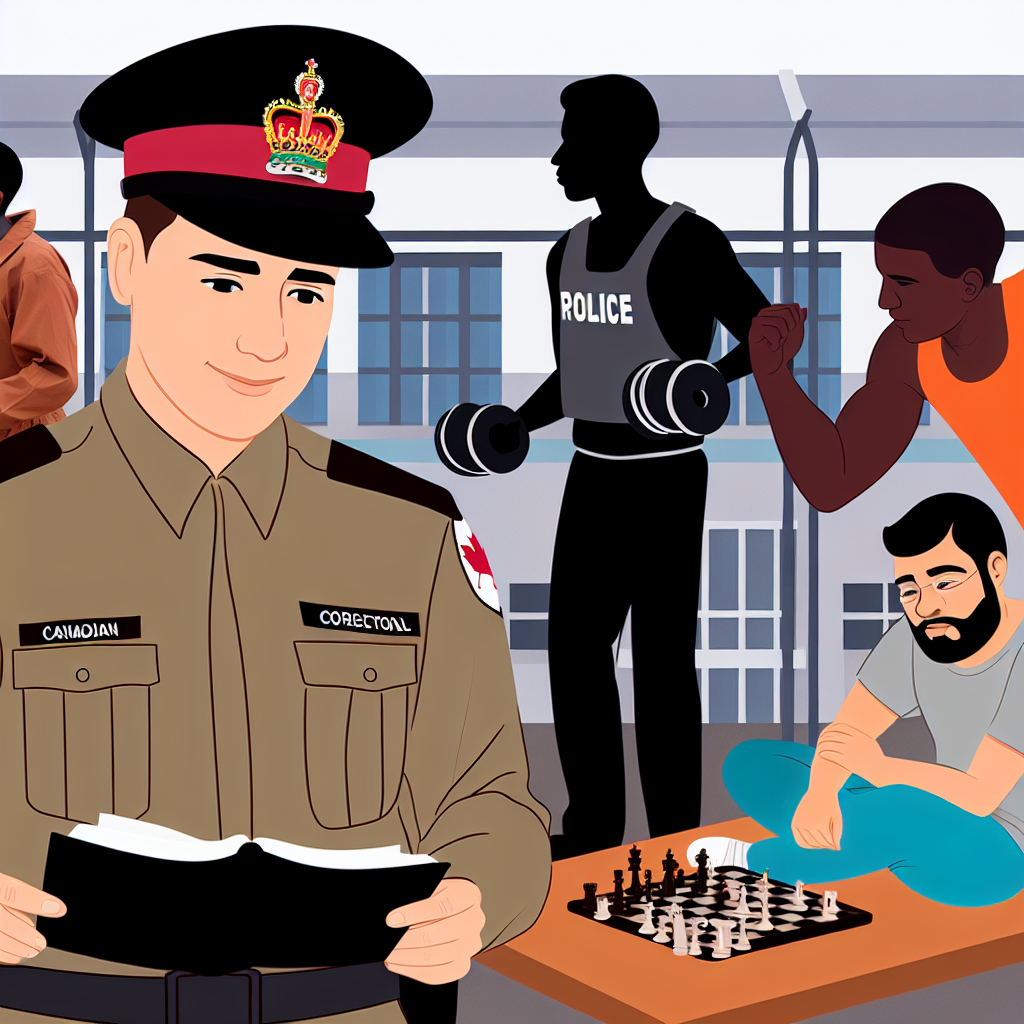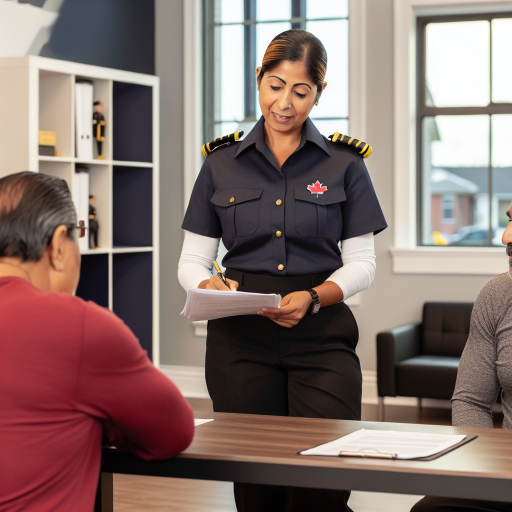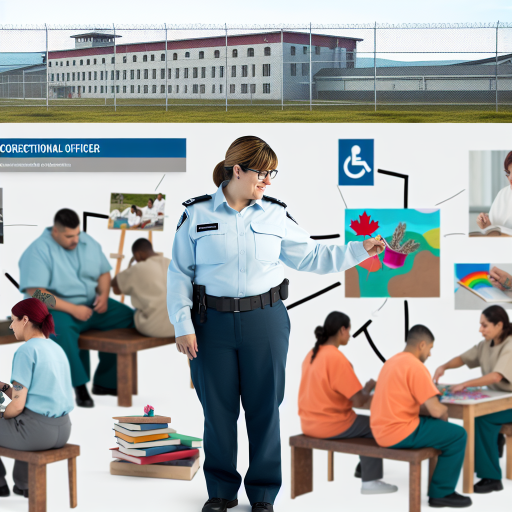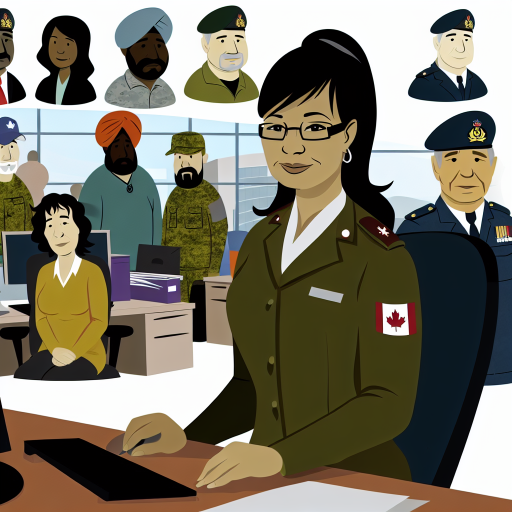Overview of the Role of Correctional Officers in the Justice System
Core Responsibilities
Correctional officers play a vital role in maintaining safety and security within correctional facilities.
They ensure that inmates comply with rules and regulations at all times.
Furthermore, they are responsible for monitoring inmate behavior.
By observing interactions, they can identify potential conflicts before they escalate.
They also conduct regular inspections to ensure that facilities remain safe and secure.
Safety and Security Management
The protection of both staff and inmates is a primary concern for correctional officers.
They implement measures to prevent incidents of violence or disturbances.
Additionally, they manage emergencies effectively, such as riots or health crises.
In such cases, quick thinking and decisive action are essential.
Moreover, they collaborate closely with law enforcement to maintain order.
Rehabilitation and Support
Correctional officers also contribute to the rehabilitation process of inmates.
They facilitate programs that help inmates develop skills for successful reintegration.
These programs can include educational classes and vocational training.
Additionally, officers provide emotional support and guidance to inmates.
By doing so, they create an environment that encourages positive behavior and growth.
Community Interaction
Correctional officers serve as a bridge between correctional facilities and the community.
They participate in outreach programs that educate the public about the justice system.
Such initiatives help to foster understanding and cooperation between communities and law enforcement.
Moreover, they play a role in advocating for policies that support inmates’ rights.
Skill Development
Correctional officers must possess a diverse set of skills to perform their duties effectively.
Strong communication skills are crucial for maintaining rapport with inmates.
Additionally, they require problem-solving abilities to navigate complex situations.
Furthermore, training in conflict resolution enhances their effectiveness on the job.
Ultimately, ongoing training is essential for adapting to evolving challenges.
The Significance of Correctional Officers in Maintaining Safety and Security
Role in the Justice System
Correctional officers are vital to the justice system.
Unlock Your Career Potential
Visualize a clear path to success with our tailored Career Consulting service. Personalized insights in just 1-3 days.
Get StartedThey maintain order in correctional facilities.
Additionally, they ensure the safety of inmates and staff.
Moreover, their presence deters misconduct and violence.
Ensuring Safety
Safety is a primary responsibility of correctional officers.
They monitor inmate behavior closely.
They intervene decisively during conflicts or disturbances.
Furthermore, they conduct regular security checks.
These actions help maintain a secure environment.
Maintaining Order
Order within facilities is crucial for rehabilitation.
Correctional officers enforce rules and regulations consistently.
They manage daily schedules for inmates effectively.
Moreover, they facilitate programs aimed at rehabilitation.
This management supports a structured environment.
Building Relationships
Building trust is essential for effective communication.
Correctional officers engage positively with inmates.
This engagement can lead to reduced tensions.
Moreover, it fosters a sense of respect and understanding.
Collaboration with Other Professionals
Correctional officers work alongside various professionals.
They collaborate with mental health specialists and social workers.
This teamwork ensures comprehensive care for inmates.
Furthermore, it enhances the overall effectiveness of the facility.
Training and Preparedness
Ongoing training is crucial for correctional officers.
They learn about conflict resolution and crisis management.
Additionally, training covers legal policies and ethics.
This education prepares them for diverse situations.
Impact on Community Safety
Correctional officers ultimately contribute to community safety.
By managing offenders, they reduce the likelihood of recidivism.
This impact enhances public safety overall.
Additionally, it fosters trust in the justice system.
Impact of Correctional Officers on Inmate Rehabilitation and Reintegration
The Role of Correctional Officers
Correctional officers serve as the backbone of the rehabilitation process.
They maintain order and safety within correctional facilities.
Their daily interactions significantly influence inmate behavior and attitudes.
Moreover, officers provide critical support for rehabilitation programs.
Encouraging Positive Behavior
Correctional officers play a key role in encouraging positive inmate behavior.
Through mentorship, they guide inmates towards making better choices.
This support fosters a sense of accountability among inmates.
Additionally, officers help in establishing trust and communication.
Facilitating Access to Programs
Correctional officers facilitate access to various rehabilitation programs.
They connect inmates with education, vocational training, and therapy.
This access is vital for equipping inmates with necessary life skills.
Furthermore, it enhances their prospects for successful reintegration into society.
Supporting Mental Health and Well-being
Officers also monitor inmates’ mental health needs.
They recognize signs of distress and provide appropriate support.
By referring inmates to mental health services, they promote well-being.
This proactive approach helps reduce recidivism rates.
Promoting Community and Social Skills
Correctional officers help inmates develop essential social skills.
They encourage participation in group activities and discussions.
This interaction fosters a sense of community among inmates.
As a result, inmates learn to cooperate and communicate effectively.
Impact of Correctional Officers on Rehabilitation
The role of correctional officers is crucial for inmate rehabilitation.
They not only maintain safety but also support personal growth.
Through their efforts, officers contribute to reducing recidivism.
This ultimately benefits the entire justice system and society.
Discover More: How to Become a Correctional Officer in Canada
The Relationship Between Correctional Officers and Other Justice System Professionals
Collaborative Roles
Correctional officers work closely with various professionals in the justice system.
Their roles often intersect with law enforcement, parole officers, and social workers.
This collaboration enhances communication and promotes efficient operations.
For example, officers regularly exchange information with police during inmate transfers.
Similarly, they coordinate with mental health professionals for inmate welfare.
Safety and Security Responsibilities
Safety is a primary concern within correctional facilities.
Correctional officers ensure secure environments for both inmates and staff.
Their vigilance helps prevent violence and maintain order.
Collaboration with security personnel aids in creating comprehensive safety protocols.
Training and Assessment
Regular training is essential for effective correctional operations.
Correctional officers undergo rigorous training alongside other justice professionals.
This training includes conflict resolution, communication skills, and crisis management.
Assessment tools measure their readiness to handle diverse situations.
Impact on Rehabilitation
Rehabilitation is a shared goal within the justice system.
Correctional officers play vital roles in inmate rehabilitation programs.
They work with educators and psychologists to foster positive inmate behavior.
Through this teamwork, they help inmates develop skills for successful reintegration.
Community Outreach and Support
Community involvement is crucial for the justice system’s success.
Correctional officers often engage with local communities to build trust.
This outreach fosters better relationships and enhances public perceptions.
They collaborate with community organizations to support former inmates.
Significance of Collaborative Efforts
Ultimately, the relationship between correctional officers and justice system professionals is critical.
These collaborations enhance safety, promote rehabilitation, and support community engagement.
Through their efforts, correctional officers positively impact the overall justice system.
Learn More: Environmental Officer Contributions to Wildlife Protection
Training and Skills Required for Effective Correctional Officers
Essential Training Programs
Correctional officers undergo rigorous training programs.
These programs focus on safety protocols and emergency response.
Moreover, they include courses on conflict resolution strategies.
Training also covers the management of inmate behavior.
Additionally, physical fitness training is a key component.
Key Skills for Success
Effective communication skills are vital for correctional officers.
They must convey instructions clearly to inmates.
Furthermore, active listening promotes a better understanding of concerns.
Decision-making abilities are equally essential in high-pressure situations.
Observational skills help officers detect potential issues early.
Interpersonal and Leadership Abilities
Correctional officers foster relationships with inmates to maintain order.
Empathy plays a crucial role in managing inmate emotions.
Leadership qualities help in guiding less experienced staff members.
Furthermore, teamwork fosters a safe working environment.
Commitment to Ethics and Professionalism
High ethical standards are mandatory for correctional officers.
They must maintain professionalism at all times.
Accountability is crucial in upholding the integrity of the justice system.
Moreover, ongoing training helps officers stay updated on ethical practices.
Discover More: Career Path for Aspiring Correctional Officers in Canada

Challenges Faced by Correctional Officers in Their Work Environment
High-Stress Situations
Correctional officers often work in extremely high-stress situations.
They must maintain order in facilities filled with volatile individuals.
Additionally, they face the constant threat of violence and conflict.
Stress can affect officers’ mental and physical health.
To cope, proper training and support systems are essential.
Staffing Shortages
Many correctional facilities face significant staffing shortages.
This challenge places additional responsibilities on existing officers.
Overworked staff can lead to burnout and high turnover rates.
As a result, facilities struggle to maintain a safe environment.
Solutions include competitive salaries and benefits to attract talent.
Limited Resources
Correctional officers often operate with limited resources.
This includes outdated training equipment and inadequate safety gear.
Limited resources can hinder their ability to perform effectively.
Consequently, this affects both officer safety and inmate management.
Advocacy for better funding is critical in this context.
Emotional and Physical Toll
The job of a correctional officer takes an emotional toll.
They frequently encounter challenging behavior from inmates.
This interaction can lead to feelings of isolation and frustration.
Moreover, physical demands of the job can lead to injuries.
Support programs can help mitigate some of these effects.
Legal and Ethical Challenges
Correctional officers must navigate a complex legal landscape.
They are responsible for upholding the rights of inmates.
However, they also must maintain security in the facility.
Finding this balance presents ongoing ethical dilemmas.
Comprehensive training on laws and ethics is crucial for officers.
Impact of Public Perception
Public perception of correctional officers can be negative.
This attitude affects their morale and job satisfaction.
Officers strive to change this perception through positive engagement.
Community outreach initiatives offer pathways to improve relations.
Ultimately, recognition of their contributions is vital.
Learn More: Stress Management for Canadian Correctional Officers
The Role of Correctional Officers in Preventing Recidivism
Building Trust and Rapport
Correctional officers play a vital role in fostering trust with inmates.
This trust encourages better communication during rehabilitation efforts.
Strong relationships can motivate inmates to engage in positive behaviors.
Providing Educational and Vocational Training
Officers often facilitate access to educational and vocational programs.
These programs equip inmates with valuable skills for reintegration.
By gaining skills, inmates decrease their likelihood of re-offending.
Monitoring Behavior and Enforcing Rules
Officers are responsible for overseeing inmate behavior in correctional facilities.
Consistent rule enforcement promotes a safer environment for everyone.
This structure helps inmates understand accountability and consequences.
Offering Support and Guidance
Correctional officers provide crucial guidance to inmates during their sentence.
This support can steer inmates away from negative influences.
Moreover, officers can connect inmates with mental health resources.
Collaborating with Mental Health Professionals
Officers often work alongside mental health professionals to assist inmates.
This collaboration ensures inmates receive appropriate psychological care.
Effective treatment reduces the risk of recidivism significantly.
Encouraging Community Involvement and Support
Correctional officers can engage community resources for inmates nearing release.
Connection with community programs aids in the transition process.
Supportive networks contribute positively to an inmate’s reintegration.
Future Trends and Developments in the Profession of Correctional Officers
Emphasis on Mental Health Support
The future of correctional officers increasingly involves mental health training.
Many facilities are prioritizing the mental well-being of both inmates and staff.
This shift helps create a more supportive prison environment.
Additionally, mental health resources provide officers with coping strategies.
Consequently, this can reduce stress and improve job performance.
Advancements in Technology
Technology continues to evolve within correctional facilities.
Officers are using advanced surveillance systems for enhanced security.
Body cameras are becoming standard for accountability and transparency.
Moreover, data analytics can help predict and prevent incidents.
This technological integration improves overall safety in prisons.
Enhanced Training Programs
Training programs for correctional officers are becoming more comprehensive.
Future training emphasizes conflict resolution and de-escalation techniques.
Hands-on simulations prepare officers for real-life scenarios.
Furthermore, diversity training fosters an inclusive workplace.
Such initiatives aim to reduce incidents of violence or misunderstandings.
Focus on Rehabilitation
The role of correctional officers is evolving towards rehabilitation.
Officers are increasingly involved in inmate programs and activities.
This hands-on engagement helps foster positive relationships.
As a result, rehabilitation efforts tend to be more effective.
This shift benefits inmates and supports the broader justice system.
Increased Emphasis on Professionalism
The professionalism of correctional officers is gaining recognition.
Greater emphasis is placed on ethical standards and conduct.
Workshops and certifications promote ongoing professional development.
This dedication enhances public perception of the correctional field.
Ultimately, it reflects the importance of officers within the justice system.
Additional Resources
The Justice System | Bureau of Justice Statistics
Handbook on police accountability, oversight and integrity A …




